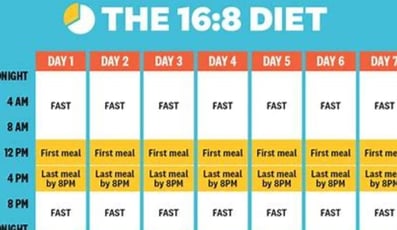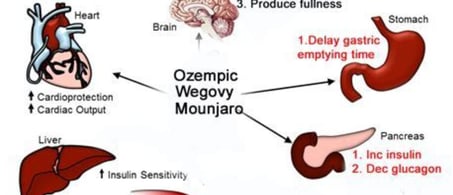
Ozempic (semaglutide) : Weight Loss & Blood Sugar management
Discover the advantages of Ozempic (semaglutide) for effective weight loss, blood sugar control, and managing pancreatitis. Explore natural, side-effect-free health solutions with GLP-1 agonists like Ozempic and Wegovy.
PHARMACY
Dr Hassan Al Warraqi


Benefits of Ozempic for Weight Loss, Blood Sugar Control
Ozempic increases insulin secretion, reduces the production of glucose in the liver, and slows down the emptying of the stomach. This helps to lower blood sugar levels and improve glycemic control.
Ozempic is intended to be used in conjunction with a healthy diet and exercise routine to effectively manage diabetes. It is administered as a once-weekly injection and has been shown to be effective in reducing HbA1c levels and promoting weight loss.
Ozempic Mechanism of Action
Ozempic (semaglutide) is a glucagon-like peptide-1 (GLP-1) receptor agonist. GLP-1 is a natural hormone that plays a role in regulating blood sugar levels.
It stimulates insulin secretion, reduces glucagon secretion, and slows down gastric emptying.
Ozempic works by mimicking the effects of GLP-1, which leads to the following effects:
Increased insulin secretion: Ozempic stimulates the release of insulin from the pancreas, especially when blood sugar levels are high. This helps to lower blood sugar levels after meals.
Reduced glucagon secretion: Ozempic reduces the release of glucagon from the pancreas. Glucagon is a hormone that raises blood sugar levels. By reducing glucagon secretion, Ozempic helps to lower blood sugar levels.
Slowed gastric emptying: Ozempic slows down the emptying of the stomach, which helps to keep blood sugar levels stable after meals.
Ozempic for Diabetes Management
Ozempic is approved by the FDA for the treatment of type 2 diabetes in adults. It is intended to be used in conjunction with a healthy diet and exercise routine.
Ozempic has been shown to be effective in reducing blood sugar levels and improving glycemic control. In clinical trials, Ozempic was shown to reduce HbA1c levels by up to 1.8%.
Ozempic for Weight Loss
Ozempic is also approved by the FDA for the treatment of obesity in adults. It has been shown to be effective in promoting weight loss.
In clinical trials, Ozempic was shown to produce an average weight loss of 15% over 68 weeks. Ozempic is thought to promote weight loss by reducing appetite and increasing satiety.
Ozempic Administration
Ozempic is administered as a once-weekly injection under the skin. It is available in pre-filled pens and syringes.
Ozempic Safety and Side Effects
Ozempic is generally safe and well-tolerated. However, it can cause some side effects, such as nausea, vomiting, diarrhea, abdominal pain, and constipation. These side effects are usually mild and go away on their own.
Ozempic can also increase the risk of pancreatitis and gallbladder problems. It is important to talk to your doctor about the risks and benefits of Ozempic before taking it.
pancreatitis
Ozempic side effect pancreatitis that have motility rate so its very dangerous to live
its not wise to put yourself in danger of death because to want to lose weight
fasting
its better to use fasting in weight loss and for controlling blood sugar and for pancreatitis if you have
intermittent fasting or Islamic is preferable
natural ways perfect and no side effect is the ideal to use to solve your problems
Main Headline: Ozempic (Semaglutide) for Diabetes and Weight Loss: Everything You Need to Know
What is Ozempic?
Ozempic (active ingredient: semaglutide) is an innovative medication approved by the FDA in 2017 for managing type 2 diabetes. It mimics the GLP-1 hormone to regulate blood sugar by stimulating insulin secretion, reducing glucose production in the liver, and slowing stomach emptying. Administered as a weekly subcutaneous injection, it is paired with a balanced diet and exercise.
Approved Uses:
Improves blood sugar control in type 2 diabetes patients.
Reduces the risk of cardiovascular events in diabetic patients with heart disease.
How Does Ozempic Work?
Boosts insulin release when blood sugar is high.
Lowers glucagon secretion, reducing liver glucose production.
Slows gastric emptying, delaying glucose absorption after meals.
Suppresses appetite as a side effect, contributing to weight loss.
Ozempic and Weight Loss: The Connection
While effective for weight loss, Ozempic is not FDA-approved for this purpose.
Wegovy, a higher-dose semaglutide formulation (2.4 mg vs. 1 mg in Ozempic), is approved for chronic weight management.
Clinical trials show Wegovy users lost 14.9% of body weight over 68 weeks.
Critical Warning:
Using Ozempic for weight loss without medical supervision risks serious side effects.
Non-diabetic individuals should consult their doctor about Wegovy instead.
Ozempic vs. Wegovy: Key Differences
FeatureOzempicWegovyPrimary UseType 2 diabetes treatmentChronic weight managementDosageUp to 2 mg2.4 mgInsurance CoverageOften coveredRarely covered
Side Effects and Risks
Common:
Nausea, vomiting, constipation, abdominal pain, headache.
Severe (Rare):
Pancreatitis, gallbladder disease, thyroid tumors (observed in animal studies).
Contraindications: Avoid in pregnancy or with a family history of thyroid cancer.
Expert Recommendations
Use Ozempic only for diabetes under medical supervision.
Avoid unapproved generics due to safety risks.
Maintain a healthy lifestyle (diet + exercise) to sustain weight loss.
Consult your doctor before stopping treatment to prevent weight regain.
Shortages and Unapproved Use
Off-label Ozempic use for weight loss has caused supply shortages, impacting diabetic patients.
The FDA warns against counterfeit versions linked to severe adverse events.
The Bottom Line
Ozempic is a powerful tool for type 2 diabetes patients, with added weight-loss benefits. However, misuse for non-diabetic weight loss poses serious risks. For obesity management, Wegovy is the safer, FDA-approved option. Always consult your doctor before starting any treatment!
Keywords: Ozempic, semaglutide, Wegovy, weight loss, type 2 diabetes, side effects, FDA, cardiovascular
key words
Ozempic , obesity ,weight, loss, blood ,sugar, pancreatitis ,fasting ,death, diet, exercise, fasting in weight loss , for controlling blood sugar , for pancreatitis ,if you have,intermittent fasting , Islamic , preferable, natural ways perfect and ,no side effect is the ideal to use to solve your problems
FAQs: Ozempic (Semaglutide) for Diabetes and Weight Loss
1. What is Ozempic, and what are its primary uses?
Ozempic (generic name: semaglutide) is a medication classified as a GLP-1 receptor agonist. It is primarily prescribed to improve blood sugar control in adults with type 2 diabetes. It is also approved to reduce the risk of major cardiovascular events (e.g., heart attack, stroke) in diabetic patients with existing heart disease. Ozempic should be used alongside a healthy diet and regular exercise.
2. How does Ozempic work to regulate blood sugar?
Ozempic works through three key mechanisms:
Stimulates insulin secretion from the pancreas when blood sugar is high.
Reduces glucagon release, lowering glucose production in the liver.
Slows gastric emptying, delaying glucose absorption after meals.
These actions collectively improve blood sugar control.
3. Is Ozempic approved for weight loss?
While Ozempic can lead to weight loss, it is not FDA-approved for this purpose. Its active ingredient, semaglutide, is available at a higher dose (2.4 mg) under the brand name Wegovy, which is FDA-approved for chronic weight management in individuals with obesity or overweight-related health issues. Doctors caution against using Ozempic for non-diabetic weight loss without medical supervision.
4. What are the potential side effects of Ozempic?
Common side effects:
Nausea, vomiting, diarrhea, constipation, abdominal pain, heartburn, fatigue, headache.
Serious risks (rare):Pancreatitis, gallbladder disease, diabetic retinopathy, hypoglycemia (when combined with other diabetes medications), and potential thyroid tumors (observed in animal studies).
Severe allergic reactions require immediate medical attention.
5. How is Ozempic administered, and what is the recommended dosage?
Administered as a weekly subcutaneous injection using a pre-filled pen.
The starting dose is 0.25 mg for 4 weeks to assess tolerance.
Gradually increased to 0.5 mg, then 1 mg, and up to a maximum of 2 mg weekly, based on blood sugar control needs.
Always follow your healthcare provider’s instructions for injection techniques.
6. What precautions should be taken before using Ozempic?
Contraindications: Do not use Ozempic if you have a personal/family history of medullary thyroid cancer or multiple endocrine neoplasia syndrome type 2.
Discuss with your doctor: Pancreatic or kidney issues, diabetic retinopathy, pregnancy (discontinue at least 2 months before planning pregnancy), or interactions with other medications (e.g., insulin or sulfonylureas, which may increase hypoglycemia risk).
7. How much weight can be lost with Ozempic, and will weight return after stopping?
Weight loss varies based on diet, exercise, genetics, and dosage.
In studies, Wegovy (higher-dose semaglutide) users lost ~14.9% of body weight over 68 weeks.
Weight regain is likely if the medication is stopped without maintaining a healthy lifestyle.
8. Are there alternatives to Ozempic for diabetes or weight loss?
Wegovy: Higher-dose semaglutide for weight loss.
Mounjaro (tirzepatide): Targets both GLP-1 and GIP receptors, showing greater efficacy in blood sugar control and weight loss compared to semaglutide in some studies.
Other GLP-1 agonists include Trulicity (dulaglutide) and Victoza (liraglutide).
Consult your doctor to determine the best option based on your health profile.
Keywords: Ozempic, semaglutide, Wegovy, type 2 diabetes, weight loss, GLP-1 agonist, side effects,














